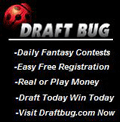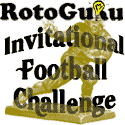RotoGuru Menu
![]() Daily blurbs
Daily blurbs
![]() Message Forum
Message Forum
![]() Forum Keepers
Forum Keepers
![]() Sponsorship
Sponsorship
![]() Troubleshooting
Troubleshooting
Football Pickoff
![]() Login
Login
![]() Standings
Standings
Football
![]() NFL Schedule
NFL Schedule
![]() Field Goals
Field Goals
![]() Player Lookup
Player Lookup
TSN Football
![]() Sortable TSN Stats
Sortable TSN Stats
![]() Weekly TSNP
Weekly TSNP
![]() Team Rankings
Team Rankings
![]() Assimilator
Assimilator
RotoHog Football
![]() Sortable RotoHog Stats
Sortable RotoHog Stats
![]() Weekly RHP
Weekly RHP
 |
Basketball
![]() Hoop Pointers
Hoop Pointers
![]() Player Lookup
Player Lookup
NBA Schedule
![]() Full Season
Full Season
![]() Next 4 weeks
Next 4 weeks
![]() Sched-O-Matic
Sched-O-Matic
TSN Hoops
![]() TSN Stats
TSN Stats
![]() Yesterday's TSNP
Yesterday's TSNP
![]() Team Rankings
Team Rankings
![]() Assimilator
Assimilator
NBASE
![]() NBASE Stats
NBASE Stats
![]() Yesterday's RHP
Yesterday's RHP
Market Madness
![]() Contest Site
Contest Site
![]() Rules
Rules
![]() Historical Stats
Historical Stats
![]() Recap of Entries
Recap of Entries
![]() Unit Returns
Unit Returns
![]() Standings
Standings
 |
Baseball
![]() MLB Schedule
MLB Schedule
![]() Base Advances
Base Advances
![]() Player Lookup
Player Lookup
TSN Baseball
![]() Sortable Stats
Sortable Stats
![]() Yesterday's TSNP
Yesterday's TSNP
![]() Team Rankings
Team Rankings
![]() Assimilator
Assimilator
RotoHog Baseball
![]() Sortable Stats
Sortable Stats
![]() Yesterday's RHP
Yesterday's RHP

Draft Bug Baseball
![]() Sortable Stats
Sortable Stats
![]() Yesterday's DBP
Yesterday's DBP
General
![[RotoGuru logo]](http://rotoguru2.com/images/gfs2.gif)
A new life in a field of dreams Reprinted with permission from The Actuary, Society of Actuaries newsletter. |
Ever dream about working in a fantasy world?
As a kid, I was an avid fan of the Cleveland Indians. I remember going to sleep at night with my transistor radio nestled under my pillow, listening to the exploits of Sam McDowell and Rocky Colavito and thinking how great it would be if someday I could be a major leaguer. Even as a teenager, when I had fully realized that I wasn't blessed with big league baseball talent, I still thought the coolest job would be that of a baseball statistician.
After 21 years as a life actuary, the last 14 as an investment specialist, I decided to pursue that fantasy, although in a way that I couldn't have imagined as a teenager. I retired from my job, and started an adventure as a fantasy sports analyst (which abbreviates, coincidentally, to F.S.A.).
Fantasy sports have grown into a major global pastime. Fantasy baseball reportedly has more than four million players worldwide. Fantasy games encompass a wide variety of formats, but the general framework involves selecting active professional athletes for a roster that you manage. The players are either chosen by a draft process or purchased using fantasy money. Your team accumulates the actual statistics that each of its players is producing in real life. These stats are then converted into a score by means of an algebraic formula or else ranked against the comparable stats for other teams in your fantasy league. During the season, players can be traded among teams or released, and free agents can be added. Some games even provide a "capital market" for buying and selling players, with each player's price changing day by day according to his market demand.
The Internet is an ideal arena for staging fantasy sports games, since statistical data is widely available, and computer programs can easily administer roster moves and manage the scoring tabulations. Virtually any sport that maintains player statistics is easily adaptable to a fantasy format. Baseball is clearly predominant today - with its most common form referred to as "rotisserie baseball" - but fantasy leagues are also widely available for football, basketball, hockey, golf, tennis, soccer, auto racing, and even sumo wrestling (so I hear). More recently, a number of sports-based stock market simulations have also emerged, which use teams and players as tradable financial instruments; the objective is to accumulate fantasy wealth rather than real stats.
I became hooked on fantasy sports because it offers a way to enjoy professional sports in a highly mathematical context. While success as a fantasy team manager requires at least a basic understanding of the sport and some familiarity with the players, the most critical skills are mathematical - including developing a trading strategy, optimizing and balancing statistical output under financial constraints, planning for unforeseen contingencies (e.g., injuries). Actuaries apply many of these skills in the real world. As an avid fantasy sports player, I found many useful Internet sources for sports information but few for technical strategic analysis. That's where I thought I could provide a useful service - and have a ball (no pun intended) while doing it.
So last December, I started a web site devoted to the analysis of fantasy sports strategy, with an emphasis on games that include a capital markets aspect. (The site generates a small amount of revenue from advertising arrangements.) I provide daily observations, statistical tables, essays on strategy, Q&A feedback columns, and an occasional contest. I already have regular readers and correspondents from around the globe. I am particularly fascinated by contrasting the inefficiencies of many of these new markets with the efficiencies of the U.S. capital markets. I can also see that, as these markets grow in size and improve their access to better and more timely information, some of those inefficiencies are gradually evaporating.
What's my day like now? I begin "work" around 8:30 a.m. by reading the sports section. (It's job related now; sounds like a fantasy already, eh?) Then I wander over to my computer, download stats from the previous night's games, create a few reports, and upload them to my Web site. I also prepare my opening commentary, in which I write whatever I want to. After an early afternoon trip to the local swimming pool for some exercise (unless I opt to golf instead), I respond to e-mail, do research, write strategy articles, and shuttle my kids to their various lessons or appointments. In the evening, I try to watch or listen to a game while I continue research and writing. The night ends with ESPN's "Sportscenter", "Baseball Tonight", or both.
It doesn't get much better than this.
There's a very important side benefit to my new venture. Both of my teenage sons have become interested in fantasy sports. So now my teenagers and I have a common area of interest - about which we can actually have a dialogue.
RotoGuru is produced by Dave Hall (a.k.a. the Guru), an avid fantasy sports player. He is not employed by any of the fantasy sports games discussed within this site, and all opinions expressed are solely his own. Questions or comments are welcome, and should be emailed to
Guru<davehall@rotoguru2.com>.© Copyright 1998-2008 by Uncommon Cents, LLC. All rights reserved.
